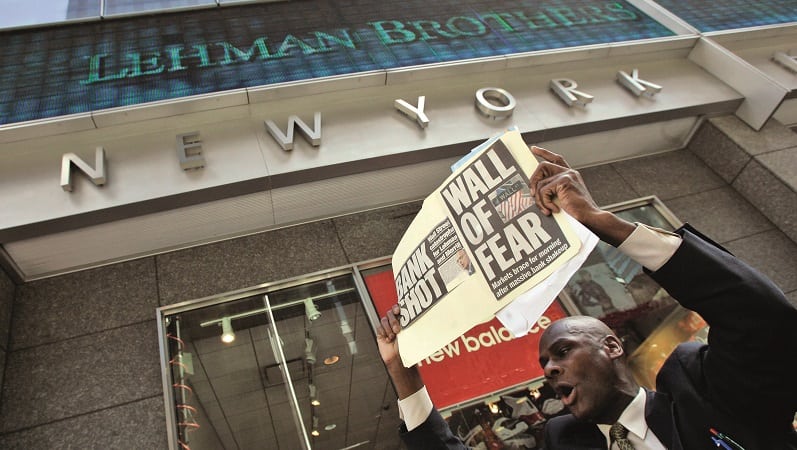An analyst note that has drawn an unflattering comparison between banks during the global financial crisis and asset managers during the coronavirus sell-off has been described as “like looking through a pair of binoculars the wrong way”.
Man Group is the only UK-listed firm out of 11 analysed by Portfolio Adviser that has outperformed the FTSE 350 since markets peaked on February 20.
In contrast, Premier Miton and FTSE 100 newcomer Intermediate Capital Group have both lost 57% over the same period, worse than the FTSE 350 travel and leisure index’s losses of 55%. Value house M&G is also near the bottom of the pack (-53%), as is Jupiter (49%).
Listed UK fund houses suffer amid coronavirus volatility
| Asset manager | Share price change from 20 February |
| Ashmore | -37.3% |
| Intermediate Capital Group | -57.1% |
| Jupiter | –49.3% |
| Liontrust | -33.6% |
| Man Group | –27.4% |
| M&G | -53.2% |
| Polar Capital | -40.7% |
| Premier Miton | –57.2% |
| River & Mercantile | –42.6% |
| Schroders | –29.1% |
| Standard Life Aberdeen | –38.1% |
| FTSE 350 | -28.2% |
Last week, fixed income funds shed a record $109bn (£93.8bn), while equity funds lost a record $23bn in the preceding week.
“The heart of this crisis likely lies in the investment community,” Deutsche Bank macro strategist Oliver Harvey said in a note to clients, cited by the Financial Times.
Meanwhile the banks, which were at the epicentre of the 2008/09 global financial crisis, are in much better shape now than they were a decade ago thanks to tougher restrictions on capital controls brought in after the last recession, he added.
But the banks have still come under pressure during the sell-off with the biggest laggard Société Générale seeing half the value of its share price wiped. HSBC has emerged better than most with shares down 8%, while JP Morgan, Deutsche Bank and Goldman Sachs have lost over a third.
| Share price change from 20 Feb | ||
| p | HSBC | (8.4%) |
| CHF | UBS | (30.9%) |
| $ | JP Morgan | (34.6%) |
| € | Deutsche Bank | (35.0%) |
| $ | Goldman Sachs | (35.5%) |
| $ | Morgan Stanley | (38.8%) |
| $ | Bank of America | (40.6%) |
| CHF | Credit Suisse | (42.0%) |
| p | Barclays | (46.5%) |
| € | BNP Paribas | (47.8%) |
| € | Société Générale | (50.0%) |
Source: AJ Bell with data from Refinitiv
Fund groups can still collect fees while other sectors suffer
But Seven Investment Management senior portfolio manager Peter Sleep says stating asset managers are at the heart of the coronavirus crisis is “like looking through a pair of binoculars the wrong way”.
“I think the investment firms are perhaps one of the better off sectors in the economy,” Sleep says. “There will be a hit, but nothing catastrophic that threatens the viability of the sector.”
Unlike huge swathes of the economy, including the self-employed and the travel and leisure sectors, that will have their income streams cut off during the crisis and face massive job cuts, asset managers are still able to charge and collect their fees, he notes.
Private assets buoy Schroders
AJ Bell investment director Russ Mould says that having a diversified product line has helped firms like Schroders weather the coronavirus volatility better than niche players like emerging markets specialist Ashmore and Intermediate Capital.
As passive funds have continued making inroads in equity markets groups like Schroders have been investing heavily in areas like private equity and infrastructure, which Sleep notes have not been as badly hit by the sell-off.
Private assets accounted for 8% or £44.2bn of Schroders’ total £500bn of assets at the end of December 2019 compared with equity and fixed income strategies in its retail funds business which made up 20% (£102.4bn).
Man Group, which has a broad offering in alternatives, hedge funds and multi-asset products, was also not as badly bruised during the sell-off.
Liontrust still achieving positive flows thanks to sustainable range
Liontrust has also come out better than other fund groups despite being more heavily weighted toward equity strategies because of its investment in sustainable funds.
The fund group was highlighted as one of the few asset managers that was still achieving positive net flows amid the market turmoil, in a market update from Numis Securities last week.
It estimates trackable AUM as at 17 March 2020 was £13.9bn with the group attracting monthly flows of over £64m into its Sustainable range and £26m into its Economic Advantage funds. This offset redemptions from its Global Fixed Income (- £25m) and Global Equity (- £46m) teams.
“Whilst there is an inevitable negative mark to market based on current market levels and exposures, we note that organic growth is one of the first lines of defence,” senior analyst David McCann said in the update. “Given that this still appears to be being delivered in such challenging market conditions is creditable in our view.”
Jupiter faces significant headwinds
But other firms have not been so lucky during the sell-off.
Jupiter was flagged by Numis as one of the asset managers facing “significant market headwinds” due to an uptick in outflows which has made marking to market “fairly severe”.
Numis estimated that the FTSE 250 fund group has racked up net outflows of £1.3bn as at 17 March 2020 with Ariel Bezalel’s Dynamic Bond fund returning to outflows (- £500m) and the European Growth range, previously run by Alexander Darwall, losing £400m.
It now assumes mutual fund outflows will persist until FY21 instead of returning to flat in H2 2020. “We think there is risk to the FY21 dividend (we assume -50%),” McCann said.







